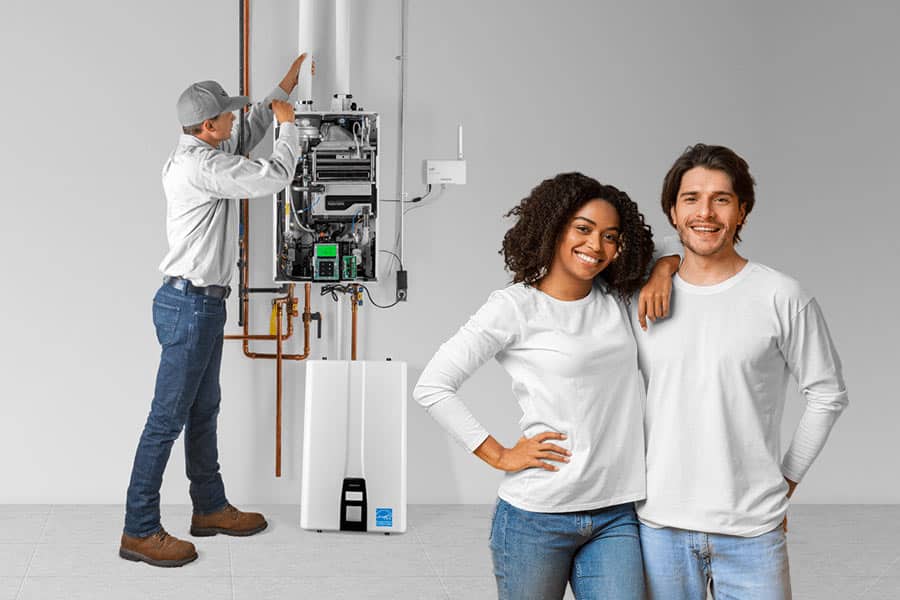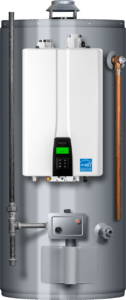Leonard Splaine Water Heaters in Woodbridge Virginia

Another advantage of tankless water heaters is their compact size. Unlike traditional water heaters, which require a large storage tank to hold hot water, tankless water heaters are much smaller and take up less space. This enables homeowners to free up valuable square footage that can be used for other purposes, which can be especially advantageous for homes with limited space.
Tankless water heaters are made to survive longer than conventional water heaters in addition to being more space-efficient and small. This is due to the fact that rust and leaks, which over time can seriously harm conventional water heaters, are less likely to occur with tankless water heaters. Homeowners who opt for tankless water heaters may be able to avoid the pricey maintenance and replacement costs linked to conventional water heaters.
When it comes to installation, it's crucial to choose the correct size tankless water heater for your household's demands. Based on the size of your home and your hot water usage habits, a professional installer can assist you in choosing the right size. Additionally, it's critical to confirm that the electrical or gas supply in your house can support a tankless water heater's demand.
In terms of maintenance, tankless water heaters require periodic flushing to eliminate mineral buildup, which can damage performance over time. Flushing can be accomplished with the aid of a specific flushing kit, which is frequently available from the manufacturer. It's also recommended to have your tankless water heater serviced annually by a professional.
Due to their energy efficiency and longer lifespan, tankless water heaters can result in long-term cost savings, even though their initial cost may be higher than that of a conventional tank-style water heater. A tankless water heater typically lasts 20 years, as opposed to a regular water heater's lifespan of 10-15 years, according to Energy.gov.
Additionally, government rebates and incentives for tankless water heaters may be available, which can help with the upfront cost. For instance, the federal government provides a tax credit of up to $300 when a qualifying tankless water heater is purchased. Local utility companies may also offer rebates for the purchase of energy-efficient appliances, including tankless water heaters.
All things considered, tankless water heaters are a practical substitute for conventional tank-style water heaters. They have a number of advantages, including longer life spans, compact size, and energy efficiency. Tankless water heaters can be an intelligent investment for homeowners seeking to lower their energy bills and lessen their environmental impact, even though their initial cost may be higher than that of a conventional water heater.
Navien is the Best Tankless Water Heater on the Market
Navien NPE-2 Series and NPN Series high efficiency gas tankless water heaters provide endless domestic hot water, all while keeping your utility bills low.

Tankless water heaters heat water as needed without using a storage tank. Simply turn on the hot water, and cold water is heated to the desired temperature as it flows through the heat exchanger inside the unit. Tankless water heaters are not only smaller and more efficient than tank-style water heaters, they provide endless hot water.
Navien offers tankless water heating systems for homes and businesses with your choice of condensing or non-condensing technology—learn more about the differences below.
Advantages of a Tankless Water Heater
We mentioned the benefits of a tankless water heater earlier. Most especially the advantages the tankless water heater has over the tank-style water heater.
Following below, we'll look at what some of these benefits are in depth.
Energy Efficiency
As previously said, energy economy is one of the main benefits of tankless water heaters. Unlike tank-style water heaters, which continually heat and store hot water in a large tank, tankless water heaters heat water only when it is needed. This means that they do not use energy to keep water hot all the time, which can save homeowners a significant amount of money on their energy bills.
In fact, according to Energy.gov, tankless water heaters can be up to 34% more energy-efficient than traditional water heaters. This is because, as opposed to continuously heating and storing water in a tank, tankless water heaters only utilize energy to heat water when it is actually needed.Unlimited Hot Water
Another advantage of tankless water heaters is that they deliver infinite hot water on demand. When using a conventional water heater, it may take some time for the tank to replenish and reheat the water after the hot water has been used up. For larger houses where numerous people require hot water at once, this can be especially frustrating.
The amount of hot water that can be utilized is not capped with a tankless water heater, however, because hot water is delivered on demand. As a result, numerous individuals can wash their clothes, do the dishes, and take showers simultaneously without ever having to worry about running out of hot water.
Space-Saving Design
Tankless water heaters are renowned for their space-saving design, as was already noted. Tankless water heaters are much smaller and take up less room than conventional water heaters, which need a sizable tank to hold hot water.
For homes with limited space, this can be especially advantageous as it frees up valuable square footage that can be put to better use. Tankless water heaters can also be wall-mounted, which further reduces space requirements and increases installation flexibility.
Longer Lifespan
Compared to conventional water heaters, tankless water heaters are renowned for having a longer lifespan. Tankless water heaters can live up to 20 years or longer, but regular water heaters normally survive about 10-15 years.
This is due to the fact that tankless water heaters are less susceptible to leaks and rust, which may gradually harm conventional water heaters significantly. Homeowners may be able to avoid the pricey maintenance and replacement costs linked to conventional water heaters by opting for tankless models.
Cost Savings
Despite having a greater initial cost than a conventional water heater, tankless water heaters can result in long-term savings because of their improved energy efficiency and longer longevity.
In comparison to a conventional water heater, a tankless water heater can save a family of four up to $95 annually, or $1,800 over the course of the appliance. This means that even while the initial investment may be costlier, tankless water heaters might be a wise choice for homes trying to lower their energy costs due to the long-term benefits.
Environmentally Friendly
Tankless water heaters are also environmentally friendly, to round things off. Since they consume less energy to operate than conventional water heaters, they can aid in lowering greenhouse gas emissions and other pollutants linked to the generation of energy.
Tankless water heaters also last longer than conventional water heaters, which means that less energy is used in their production and disposal over time. This may lessen the environmental impact of manufacturing and disposing of water heaters.
Bulky tanks are history... Navien high efficiency tankless is the future
- Endless hot water when you want it
- Compact, space-saving design: wall-hung units free up floor space
- Lower energy bills
- Longer life than tanks
- 15 year warranty dual stainless steel heat exchangers

Looking for a New Tankless Water Heater or Need to Service One?
Are you interested in tankless water heaters and how they can change your home or office environment for the better or do you need your standard water heater replaced or serviced? Then give our team of experts at Leonard Splaine a call today. We will find the best solution for your needs!

How Do Tankless Water Heaters Work?
On-demand water heaters, commonly referred to as tankless water heaters, heat water as it passes through the device rather than keeping it in a tank. We'll go into more detail about tankless water heater operation in the discussion that follows.
The Components of a Tankless Water Heater
It's crucial to comprehend the many parts of a tankless water heater before delving into its operation. A heat exchanger, a burner, a gas or electric source, and a thermostat or temperature control make up a conventional tankless water heater.
Heat Exchanger
The unit's heat exchanger is in charge of warming the water as it passes through it. It is made to transport heat from the burner to the water and is often composed of copper or stainless steel.
Burner
The heater's heat source is the burner. It is in charge of heating the water as it passes through the heat exchanger and can be powered by either natural gas or propane.
Gas or Electric Power Source
Power for the appliance comes from a gas or electric source. While electric tankless water heaters just need a power source from an electrical outlet, gas-powered tankless water heaters need a gas line to supply fuel for the burner.
Thermostat
The thermostat, also known as a temperature control, is in charge of adjusting the temperature of the water as it travels through the appliance. It can be set to a particular temperature, ensuring that the water leaving the appliance is at the appropriate temperature.
How the Tankless Water Heater Works
Cold water enters the tankless water heater through a pipe when hot water is required. Water is heated by the burner as it passes through the heat exchanger. The water's temperature rises as it travels through the heat exchanger and receives heat from the burner.
The temperature of the water as it circulates through the appliance is controlled by the thermostat or temperature control. It can be adjusted to a precise temperature, ensuring that the water that emerges from the appliance is at the right temperature.
After being heated, the water exits the tankless water heater and enters the house's plumbing. Showering, washing dishes, and doing laundry are just a few of the things that can be done with the water, which is made accessible on demand.
No need for a tank is necessary because tankless water heaters heat water as it is needed. As a result, the appliance only utilizes energy when hot water is required, as opposed to continuously heating and storing water in a tank.
Gas vs. Electric Tankless Water Heaters
Electric and gas-powered tankless water heaters are the two primary categories. Electric tankless water heaters often use more energy than gas-powered models, which can run on either natural gas or propane.
Gas-powered tankless water heaters can deliver hot water to more fixtures simultaneously than electric tankless water heaters because they have a higher flow rate. Because of this, they are a better option for bigger homes or residences with higher hot water demands.
On the other side, electric tankless water heaters are often less expensive to buy and install than gas tankless water heaters. Additionally, they take up less area to install because they are more compact.
However, compared to gas-powered tankless water heaters, electric tankless water heaters have a lower flow rate, which may prevent them from simultaneously supplying hot water to several fixtures. Larger households or homes with a high demand for hot water may have this issue.
Common Misconceptions About Takless Water Heaters
As we already mentioned, the many advantages that tankless water heaters have over conventional tank-style water heaters have helped them become more and more popular in recent years.
Tankless water heaters, however, are the subject of many myths and misconceptions, just like any new technology. We will look at a few of the widespread myths concerning tankless water heaters in this article.
Misconception 1: Compared to typical water heaters, tankless water heaters are more expensive in the long and short terms.
The idea that tankless water heaters are more expensive than conventional water heaters is one of the most widespread misconceptions about them. Tankless water heaters can cost more up front than conventional water heaters, but over time, because of their energy efficiency, they can end up saving households money.
Traditional water heaters constantly heat water even when it is not being used because they store hot water in a tank. On the other hand, tankless water heaters use less energy overall because they only heat water as needed. This can result in significant energy savings over time, which can help to offset a tankless water heater's higher initial cost.
Misconception 2: Instant hot water is provided by tankless water heaters.
Tankless water heaters can produce hot water on demand, however they cannot produce hot water instantly. There may be a little delay before hot water is available since it takes a few seconds for the water to heat up as it moves through the heat exchanger.
However, most people do not notice this delay because it usually lasts only a few seconds. Users may actually experience reduced hot water wait times thanks to tankless water heaters' ability to provide hot water more quickly than conventional water heaters.
Misconception 3: Compared to conventional water heaters, tankless water heaters requires more maintenance.
The idea that tankless water heaters require more maintenance than conventional water heaters is another prevalent misperception about them. Tankless water heaters do need some maintenance, although it is not noticeably more than with conventional water heaters.
Both tankless and conventional water heaters need to be periodically flushed to get rid of sediment and mineral buildup. Nevertheless, depending on the location's water hardness, tankless water heaters can need to be flushed more frequently than conventional water heaters.
In order to make sure the heat exchanger is operating effectively, tankless water heaters also need to regularly inspect and clean it. However, a professional can complete this maintenance because it is often straightforward.
Misconception 4: Large homes cannot use tankless water heaters to heat enough water.
The idea that tankless water heaters can't provide enough hot water for large houses is another prevalent fallacy. There are various kinds that can handle the hot water needs of bigger families, even if some tankless water heaters do have lower flow rates than conventional water heaters.
In fact, some tankless water heaters are built to deliver hot water to many fixtures simultaneously, so they can offer adequate hot water for even the biggest families.
Misconception 5: Tankless water heaters are disruptive and noisy.
Finally, the idea that tankless water heaters are noisy and disruptive is another fallacy that exists. Although some tankless water heaters can be noisy, many more recent types are made to run quietly and effectively.
In reality, traditional water heaters, which can be noisy as they cycle on and off to maintain the temperature of the water in the tank, are frequently quieter than tankless water heaters.
To sum up, tankless water heaters provide numerous advantages over conventional tank-style water heaters, including energy efficiency, limitless hot water, and a lesser environmental impact.
Tankless water heaters are the subject of several misunderstandings and urban legends, but it's crucial to weigh the facts and conduct your own study before buying one. A tankless water heater can supply dependable and effective hot water for a long time with the right upkeep and care.

Our 100% Satisfaction Guarantee
We're so confident you'll find us to be a company you can rely on for all your heating and air conditioning needs that we guarantee your complete satisfaction! Contact us today and experience the difference for yourself.
How to Properly Maintain a Tankless Water Heater
You already know how fantastic tankless water heaters are if you've read this far in this piece. Tankless water heaters need routine maintenance, just like any other appliance, to keep them performing at their best. The maintenance procedures that homeowners should carry out to keep their tankless water heater in good working order are covered below.
Flush the System
Flushing the system on a regular basis is one of the most crucial maintenance duties for a tankless water heater. Minerals and sediment may accumulate inside the appliance over time, which may have an impact on how well it functions. To get rid of these deposits and keep the machine operating efficiently, flush the system.
Homeowners should first shut off the unit's electricity and water supply before flushing a tankless water heater. Then, they should run a hose to a drain or outdoors and connect it to the drain valve on the bottom of the appliance. The water should then be allowed to run through the system for a few minutes until it is clear after they have opened the valve. They should then remove the hose and close the valve.
Check the Venting System
Checking the venting system for obstructions or blockages is another crucial maintenance duty for a tankless water heater. The venting system is in charge of eliminating the appliance's exhaust gases, and any obstructions may result in substandard operation or even carbon monoxide poisoning.
Homeowners should first cut off the unit's power and gas supply before inspecting the venting system. The vent pipes should then be checked for any indications of damage, such as cracks or holes. Additionally, they must search for any impediments that might be obstructing the venting system, such as bird nests or other garbage. Homeowners should get in touch with a trained specialist to fix any damage or obstructions identified.
Clean the Air Filter
Another crucial element of a tankless water heater that needs routine maintenance is the air filter. The unit's performance and efficiency may be impacted by dirt and particles in the air utilized for combustion, which the air filter helps to eliminate.
Homeowners should endeavor to cut off the unit's electricity and gas supply before cleaning the air filter. The air filter on the appliance should then be found and taken out.
The filter should then be cleaned with a gentle brush or by running water over it. They ought to replace the filter in the appliance after it has been cleaned.
Monitor the Water Pressure
Checking the water pressure is a crucial component of tankless water heater maintenance. The performance and efficiency of the appliance can be impacted by low water pressure, whereas the appliance might be damaged by high water pressure.
Homeowners should first cut off the unit's electricity and gas supply before checking the water pressure. The cap should then be removed from the pressure relief valve on the appliance. The next step is to open a hot water tap in the house and connect a pressure gauge to the valve. 30 to 80 psi should appear on the gauge. Homeowners should get in touch with a competent specialist to make changes if the pressure is too high or too low.
Check for Leaks
Finally, property owners should routinely inspect the area around their tankless water heater for leakage. Any leaks should be fixed as soon as possible because they can cause water damage or even mold growth.
Homeowners should first switch off the unit's power and water supply to check for leaks. Then, they should look for any indications of water damage or dampness by inspecting the unit and its surroundings. Additionally, they need to look for leaks by inspecting the connections and fittings. Homeowners should get in touch with a skilled professional to perform repairs if they discover any leaks.
Tankless Water Heater Installation
For homeowners wishing to lower their energy costs and free up space in their house, installing a tankless water heater might be a wise investment. To ensure the device runs securely and effectively, however, correct installation is essential. We will go over the procedures for installing a tankless water heater in this article.
Step 1: Select the Appropriate Location
Choosing the ideal site is the first step in installing a tankless water heater. The location of the appliance should have access to the gas and water connections, as well as excellent ventilation. Additionally, it ought to be set up on a solid, flat surface.
Step 2: Select the Correct Size
Choosing the right tankless water heater size is the next step. The number of fixtures in the house and the anticipated hot water usage will determine the size of the unit. The ideal size for your home can be determined with the aid of a qualified professional.
Step 3: Install the Gas and Water Lines
The installation of the gas and water lines comes next after the location and size have been chosen. This stage should be carried out by a qualified professional to guarantee that the installation complies with regional building rules and safety requirements.
Step 4: Install the Venting System
Another crucial element of the installation of a tankless water heater is the venting system. The exhaust gases are taken out of the appliance by the venting system and released outside. The kind of unit and the installation's location will determine the kind of venting system needed. This phase should be carried out by a qualified professional to guarantee that the venting system is built correctly and securely.
Step 5: Mount the Unit
The tankless water heater can be mounted once the gas, water, and venting lines have been installed. The device must be firmly positioned on a solid, level surface. To provide for sufficient ventilation and access to the water and gas lines, the appliance should be installed high enough.
Step 6: Connect the Pipes
Connecting the pipes completes the installation process. This entails connecting the home's hot and cold water lines as well as the water and gas connections to the appliance. This stage should be carried out by a qualified plumber to guarantee that the installation complies with regional building rules and safety requirements.
Step 7: Post-Installaton Inspection
The tankless water heater should be inspected following installation to make sure it is running securely and effectively. Homeowners should also be sure to adhere to the manufacturer's recommendations for routine maintenance to keep the appliance in good working order.
In conclusion, careful preparation and attention to detail are necessary for installing a tankless water heater. It's crucial to pick the proper size, position, and venting system, as well as to engage a qualified expert to perform the installation. A tankless water heater may deliver energy-efficient and space-saving hot water for many years with appropriate installation and routine maintenance.
Leading Tankless Water Heater Manufacturers
Here are just a few of the industry leaders in tankless water heater production. There are numerous other trustworthy brands available as well. It's critical to take into account your household's size, hot water usage, and income when selecting a tankless water heater, as well as the particular features and technology that each manufacturer offers.
Rinnai
For more than a century, the Japanese manufacturer Rinnai has been producing tankless water heaters. For both household and commercial use, they have a variety of tankless water heaters available. The condensing technique used by Rinnai, which enables greater efficiency and reduced emissions, is one example of the company's cutting-edge technology. Rinnai is renowned for its high-quality, long-lasting products.
Navien
Since 1978, the Korean company Navien has been producing tankless water heaters. They are renowned for producing items that are both environmentally and energy-friendly. The tankless water heaters from Navien utilize cutting-edge technology to continuously supply hot water, including dual stainless steel heat exchangers and a buffer tank.
Noritz
For more than 50 years, the Japanese manufacturer Noritz has been producing tankless water heaters. For both household and commercial use, they have a variety of tankless water heaters available. The tankless water heaters made by Noritz are renowned for their dependability and great efficiency. They employ cutting-edge technology to produce a steady flow of hot water, including dual flame burners and a turbocharger.
Rheem
Since the 1930s, the American manufacturer Rheem has been producing water heaters. Their EcoSense brand includes a variety of tankless water heaters. Tankless water heaters made by Rheem are renowned for their dependability and energy efficiency. They employ cutting-edge technology to deliver a steady supply of hot water, including computerized controllers and modulating burners..
Bosch
For more than a century, the German company Bosch has been producing tankless water heaters. For both residential and commercial use, they have a variety of tankless water heaters available. Tankless water heaters made by Bosch are renowned for their dependability and efficiency. They employ cutting-edge technology to supply hot water steadily, including modulating burners and electronic controls.
Contact Leonard Splaine for Professional Tankless Water Heater Installation and Maintenance
 For the best tankless water heater repair services, contact our team of professionals today. To schedule your installation and enjoy the advantages of a tankless water heater in your home or place of business, contact us right away.
For the best tankless water heater repair services, contact our team of professionals today. To schedule your installation and enjoy the advantages of a tankless water heater in your home or place of business, contact us right away.

We Are the Expert Solution to All Your HVAC & Home Comfort Needs
Take it from our customers: we solve problems and deliver solutions like no other HVAC company can. Contact us today!







